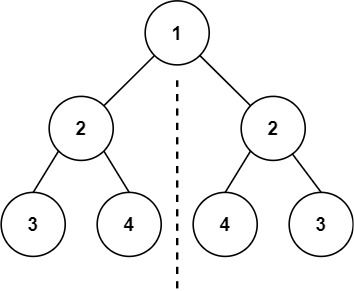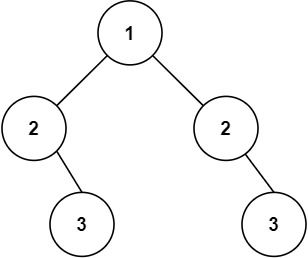| comments | difficulty | edit_url | tags | ||||
|---|---|---|---|---|---|---|---|
true |
Easy |
|
Given the root of a binary tree, check whether it is a mirror of itself (i.e., symmetric around its center).
Example 1:
Input: root = [1,2,2,3,4,4,3] Output: true
Example 2:
Input: root = [1,2,2,null,3,null,3] Output: false
Constraints:
- The number of nodes in the tree is in the range
[1, 1000]. -100 <= Node.val <= 100
Follow up: Could you solve it both recursively and iteratively?
We design a function
The logic of the function
- If both
$\textit{root1}$ and$\textit{root2}$ are null, the two binary trees are symmetric, and we returntrue; - If only one of
$\textit{root1}$ and$\textit{root2}$ is null, or$\textit{root1.val} \neq \textit{root2.val}$ , we returnfalse; - Otherwise, we check whether the left subtree of
$\textit{root1}$ is symmetric with the right subtree of$\textit{root2}$ , and whether the right subtree of$\textit{root1}$ is symmetric with the left subtree of$\textit{root2}$ , using recursion.
The time complexity is
# Definition for a binary tree node.
# class TreeNode:
# def __init__(self, val=0, left=None, right=None):
# self.val = val
# self.left = left
# self.right = right
class Solution:
def isSymmetric(self, root: Optional[TreeNode]) -> bool:
def dfs(root1: Optional[TreeNode], root2: Optional[TreeNode]) -> bool:
if root1 == root2:
return True
if root1 is None or root2 is None or root1.val != root2.val:
return False
return dfs(root1.left, root2.right) and dfs(root1.right, root2.left)
return dfs(root.left, root.right)/**
* Definition for a binary tree node.
* public class TreeNode {
* int val;
* TreeNode left;
* TreeNode right;
* TreeNode() {}
* TreeNode(int val) { this.val = val; }
* TreeNode(int val, TreeNode left, TreeNode right) {
* this.val = val;
* this.left = left;
* this.right = right;
* }
* }
*/
class Solution {
public boolean isSymmetric(TreeNode root) {
return dfs(root.left, root.right);
}
private boolean dfs(TreeNode root1, TreeNode root2) {
if (root1 == root2) {
return true;
}
if (root1 == null || root2 == null || root1.val != root2.val) {
return false;
}
return dfs(root1.left, root2.right) && dfs(root1.right, root2.left);
}
}/**
* Definition for a binary tree node.
* struct TreeNode {
* int val;
* TreeNode *left;
* TreeNode *right;
* TreeNode() : val(0), left(nullptr), right(nullptr) {}
* TreeNode(int x) : val(x), left(nullptr), right(nullptr) {}
* TreeNode(int x, TreeNode *left, TreeNode *right) : val(x), left(left), right(right) {}
* };
*/
class Solution {
public:
bool isSymmetric(TreeNode* root) {
auto dfs = [&](this auto&& dfs, TreeNode* root1, TreeNode* root2) -> bool {
if (root1 == root2) {
return true;
}
if (!root1 || !root2 || root1->val != root2->val) {
return false;
}
return dfs(root1->left, root2->right) && dfs(root1->right, root2->left);
};
return dfs(root->left, root->right);
}
};/**
* Definition for a binary tree node.
* type TreeNode struct {
* Val int
* Left *TreeNode
* Right *TreeNode
* }
*/
func isSymmetric(root *TreeNode) bool {
var dfs func(root1, root2 *TreeNode) bool
dfs = func(root1, root2 *TreeNode) bool {
if root1 == root2 {
return true
}
if root1 == nil || root2 == nil || root1.Val != root2.Val {
return false
}
return dfs(root1.Left, root2.Right) && dfs(root1.Right, root2.Left)
}
return dfs(root.Left, root.Right)
}/**
* Definition for a binary tree node.
* class TreeNode {
* val: number
* left: TreeNode | null
* right: TreeNode | null
* constructor(val?: number, left?: TreeNode | null, right?: TreeNode | null) {
* this.val = (val===undefined ? 0 : val)
* this.left = (left===undefined ? null : left)
* this.right = (right===undefined ? null : right)
* }
* }
*/
function isSymmetric(root: TreeNode | null): boolean {
const dfs = (root1: TreeNode | null, root2: TreeNode | null): boolean => {
if (root1 === root2) {
return true;
}
if (!root1 || !root2 || root1.val !== root2.val) {
return false;
}
return dfs(root1.left, root2.right) && dfs(root1.right, root2.left);
};
return dfs(root.left, root.right);
}// Definition for a binary tree node.
// #[derive(Debug, PartialEq, Eq)]
// pub struct TreeNode {
// pub val: i32,
// pub left: Option<Rc<RefCell<TreeNode>>>,
// pub right: Option<Rc<RefCell<TreeNode>>>,
// }
//
// impl TreeNode {
// #[inline]
// pub fn new(val: i32) -> Self {
// TreeNode {
// val,
// left: None,
// right: None
// }
// }
// }
use std::cell::RefCell;
use std::rc::Rc;
impl Solution {
pub fn is_symmetric(root: Option<Rc<RefCell<TreeNode>>>) -> bool {
fn dfs(root1: Option<Rc<RefCell<TreeNode>>>, root2: Option<Rc<RefCell<TreeNode>>>) -> bool {
match (root1, root2) {
(Some(node1), Some(node2)) => {
let node1 = node1.borrow();
let node2 = node2.borrow();
node1.val == node2.val
&& dfs(node1.left.clone(), node2.right.clone())
&& dfs(node1.right.clone(), node2.left.clone())
}
(None, None) => true,
_ => false,
}
}
match root {
Some(root) => dfs(root.borrow().left.clone(), root.borrow().right.clone()),
None => true,
}
}
}/**
* Definition for a binary tree node.
* function TreeNode(val, left, right) {
* this.val = (val===undefined ? 0 : val)
* this.left = (left===undefined ? null : left)
* this.right = (right===undefined ? null : right)
* }
*/
/**
* @param {TreeNode} root
* @return {boolean}
*/
var isSymmetric = function (root) {
const dfs = (root1, root2) => {
if (root1 === root2) {
return true;
}
if (!root1 || !root2 || root1.val !== root2.val) {
return false;
}
return dfs(root1.left, root2.right) && dfs(root1.right, root2.left);
};
return dfs(root.left, root.right);
};
